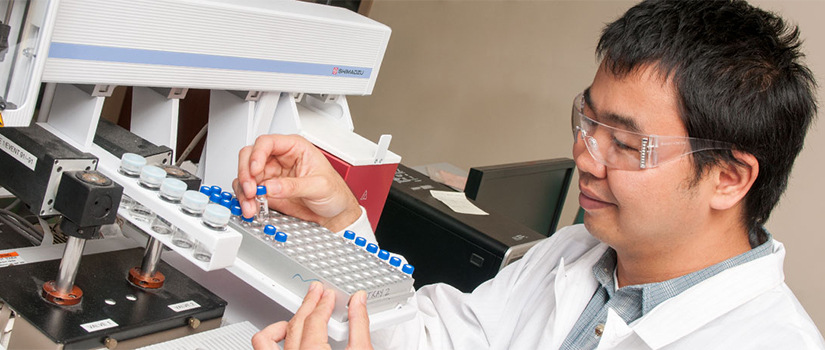Why Chemical Engineering Graduate Study?
A graduate degree in chemical engineering can improve your career by equipping you to work on advanced projects or enable you to transition to a new path in research or teaching.
Chemical engineering at USC boasts state-of-the-art facilities, a dynamic faculty and rigorous research programs. Incentives for our Ph.D. candidates are the wide selection of research topics, full tuition waiver and high 12-month stipends. Full-time Ph.D. student stipends currently are $32,000 per year with tuition and health insurance. NSF Fellows and other students with similar fellowships can receive stipends totaling over $42,000 per year.
Have a degree in chemistry, biomedical engineering, material science or something else?
Each year, we accept a number of excellent graduate students with non-chemical engineering backgrounds, including material science, chemistry and biomedical engineering and more.
Ph.D. students are expected to pass all graduate course requirements without taking remedial course work. As such, GPA requirements are more stringent for students without a background in chemical engineering.
Our M.E. program has been designed in a special course sequence for students with different backgrounds. See programs of study to learn more.
Programs of Study
The Chemical Engineering Doctor of Philosophy (Ph.D.) degree focuses on research. The Ph.D. is essential for chemical engineering faculty positions in higher education, as well as for many research and development occupations in industry and government laboratories. Our chemical engineering graduate degrees also include the Master of Engineering (M.E.), which is perceived to be more practically oriented and the Master of Science (M.S.), which includes a thesis.
All chemical engineering graduate programs include core courses in four areas:
- Chemical Process Analysis
- Advanced Chemical Engineering Thermodynamics
- Advanced Fluid Flow Analysis
- Advanced Mass Transfer
Elective courses can be tailored to your specific interests, providing the opportunity to further strengthen your technical expertise or to gain additional knowledge in project management or entrepreneurship.
Visit Graduate Handbooks and Curricula for additional detail.
Our Ph.D. program in chemical engineering focuses on the quantitative methods characteristic of engineering. We strive to provide an advanced foundation in traditional chemical engineering topics, electives to complement your research area, and professional development training to prepare you for high-level research and development in industry or academia.
A total of 60 credit-hours beyond the bachelor’s degree are required for the Ph.D. in Chemical Engineering. Degree components include:
- Research resulting in a dissertation proposal, a dissertation, a dissertation defense, publications and 30 hours of dissertation credit
- 12 hours of core chemical engineering courses
- 12 hours of approved electives
- 6 hours of directed research
- Qualifying and comprehensive exams
Chemical engineering Ph.D. students acquire the ability to identify pertinent research problems, to formulate and execute a research plan, to generate and analyze original research results, and to communicate those results through oral presentations and written publications submitted to refereed archival journals. They also acquire advanced skills for life-long learning and professional development.
Our M.S. program in chemical engineering focuses on the quantitative methods characteristic of engineering. You may also choose between a variety of electives tailored to your specific interests. In combination with research, this program of study will provide you with the skills necessary to obtain a position in advanced industry, research or development.
A total of 30 credit hours are required for the M.S. in Chemical Engineering. Degree components include:
- Research resulting in a thesis, thesis defense, publication, and 6 hours of thesis credit
- 12 hours of core chemical engineering courses
- 12 hours of approved electives from engineering, business, chemistry, or mathematics
- A comprehensive exam
The Chemical Engineering M.S. program provides advanced knowledge in core areas of chemical engineering and prepares students to design and conduct research studies and to engage in life-long learning and professional development.
This 30 semester-hour program is designed to give students focused training in the practice of chemical engineering.
Major components of the Chemical Engineering M.E. program include:
- 12 hours of core chemical engineering courses
- 18 hours of approved electives from engineering, business, chemistry, or mathematics.
- A comprehensive exam
Students in the Chemical Engineering M.E. program develop expertise in the core subject areas of chemical engineering and advance professionally in their careers.
Areas of Specialization
Course work and research can generally be conducted in any sub-discipline of chemical engineering coinciding with the research interests of our faculty, which include these topics:
- Biomedical Engineering
- Catalyst Design and Evaluation
- Computational Modeling and Molecular Engineering
- Electrochemical Engineering
- Materials and Soft Matter
- Separations
Visit the Chemical Engineering Department for more information on our faculty and research areas
Graduate Admissions
Admission to chemical engineering graduate programs is competitive. All applications must be submitted to the Graduate School of the University of South Carolina. The Graduate School provides helpful information on the admissions application process and even lets you know what to do before you apply. The department of chemical engineering subsidies the application fee, reducing it to $35. Applications are being accepted for both a fall and spring start date.
All graduate degrees in chemical engineering are open to students with backgrounds in chemical engineering or related fields. Each year, we accept a number of excellent graduate students with non-chemical engineering backgrounds, including material science, chemistry and biomedical engineering. All accepted Ph.D. students, including those with non-chemical engineering backgrounds, are expected to pass all graduate course requirements without taking remedial course work. As such, GPA requirements are more stringent for students without a background in chemical engineering. The M.E. degree in chemical engineering has been designed in a special course sequence for students with different backgrounds.
Test Scores:
Students whose native language is not English must submit a satisfactory score on an English proficiency test. The Accepted English proficiency tests include the TOEFL exam (minimum score of 80 on the internet-based test), IELTS International Academic Course Type 2 exam (minimum score of 6.5), and the PTE Academic (minimum score of 53).
